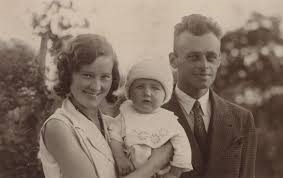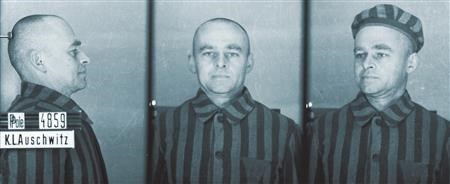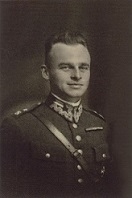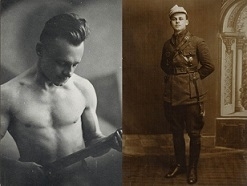 |
| (washington.mfa.gov.pl) |
"I got a blow in my jaw with a heavy rod. I spat out my two teeth. Bleeding began. From that moment we became mere numbers - I wore the number 4859" (NPR staff). Witold Pilecki wrote of this experience when he was in the Auschwitz concentration camp, yet that's not all his life consisted of. Pilecki was born on May 19, 1901 to a Polish family in Olonets, Russia. He was raised with his three siblings Maria, Wanda, Jerzy, by Julian Pilecki and Ludwika Pilecka. Witold went on to have and raise his son and daughter with Maria Ostrowska in 1929. Through these many years, Pilecki managed to become a Polish soldier, and found The Secret Polish Army. As well as being an active social worker, winning the Polish Cross of Valor twice, and volunteering to go into the Auschwitz concentration camp (Woli). Witold was the hero he was as he possessed selflessness and bravery to achieve his goals and benefit others. He consistently put others before himself showing his true selflessness. All he did was for the sake of others and managed to ignore his feelings to help the people in need. By fighting in many battles, along with going into the Auschwitz concentration camp, Witold only strived to help and assist others. Also, his bravery made him even more of a hero as he had the courage and strength to do and get through difficult things. Witold used his bravery to help the people inside of Auschwitz and even contributed to the defeat of the Germans in World War II, along with fighting his own battles for his country.. He also always did things that could benefit others and help his community while dismissing his well being. These things make up why he is an inspiration and hero.
 |
| (Auschwitz Birkenau State Museum) |
Witold pilecki was selfless because of his act of deciding to sacrifice almost 3 years of his life to be in the Auschwitz camp. By volunteering for this dangerous mission, he knew he had to be away from his family, friends, and the entire outside world with enduring unknown dangers as well. Witold still took on the mission, which shows the great amounts of selflessness that he truly did possess. When Witold was going into the purgatory, he knew there was something very odd about the way it was being ran and saw for himself as he first entered. They treated him brutally and the horrors just built on from there as he "endured crippling work details and illness while organizing a secret group known as the Union of Military Organizations (Polish acronym ZOW) that worked to improve inmate morale, provide news from outside, distribute surplus food and clothing, gather intelligence and train men to seize the camp in the event of a relief attack"(Lyson). As a mission for his country to help the people inside the camp, he encountered many illnesses and manual labor yet was able to push through it all. With Witold not even getting the proper things humans need to survive, he still kept his strong determination and had only the concern of others in mind. Also at the same time he was helping to stop the cruel ways of the camp. With all of these events occurring, he never gave up and only kept gathering information and evidence in mind. He also, along with the help of others, provided support for those inside the camp by organizing the ZOW (a small secret group within). Most people would have given up immediately, but Witold kept strong for his operation and the lives of others. Witold showed true selflessness through his journey at Auschwitz. He always kept a clear mind though seeing all the things he did and still had the strength to do the things he did. He could of easily given up his fight at Auschwitz, as many did, but with the selfless he held, "he had enough reserves of strength and determination left to help others and to build up an underground resistance organization within the camp. Not only that, he managed to keep a clear head at all times and recognize what he needed to do in order to stay alive"(Reed). Strictly survival took strength and determination portrayed by Witold through his 2 year journey in Auschwitz. He even had enough strength to find a way to help others by creating "an underground resistance organization within the camp"(Reed). Pilecki also gathered information about Auschwitz despite the dangers of being caught and killed due to his work as a spy within the camp. His selflessness was not only showed in his volunteering, but with helping others stay strong and working to get through the terrible times they were forced to endure. With Witold seeing and experiencing all the pain Auschwitz had to offer, his selflessness helped him stay strong for the others in the camp as well as his mission as his work within also gave the outside world a taste at what was really happening inside the concentration camps.
 |
| (www.war-talk.com ) |
Witold's bravery was not only shown through his bold act of volunteering for Auschwitz, but was seen even after and before his experiences within the camp. He continued to help his country by taking more life risking missions and even was a help to the victory of World War II. Before Pilecki could even be sent into the camp, he had to find a way in. He was to be arrested by the Nazis and hopefully taken to The Auschwitz camp that was located where his intelligence was in Poland. The bravery of this was that he could have been taken to any one of the many camps which meant he could have been sacrificing so much for nothing. As "he would arrange to be arrested in the hope that the Nazis, instead of executing him, might send him to the Auschwitz camp where he could gather information and form a resistance group from the inside"(Reed). With knowing that he may be killed even before he was sent to Auschwitz, portrays the amount of bravery that he held. It also wasn't known exactly where he was going to be put as Auschwitz was only one of the many concentration camps open at the time. He may have been sent to a random camp and not have been able to provide information about his experiences which proves the true bravery and selflessness he possessed. The courage that it must of took to stay strong and leap out of his comfort zone to sacrifice 2 and a half years of his life, with solely the purpose of helping his country and people, truly defines what it means be heroic. Witold's bravery along with all his efforts in going into the Auschwitz camp is not the only bold thing he's done. After all the chaos he went through, he still had the strength to go on and help the Polish army even more on the mission, "the one that killed him. At war's end in 1945, Pilecki made for Italy, to report to the command of a Polish Army that had helped the Americans and the British defeat the Germans. He then accepted what would turn out to be his final mission" (Snyder). Pileckis information within the camp helped to end the terror that Hitler was causing. It provided the British and U.S with a valuable information from someone who had been inside Auschwitz's walls, that then helped them defeat the Germans. As how Snyder states what Pilecki did was one of the most courageous things anyone has ever done, this can be seen on how Witold went through 2 years at Auschwitz, came out of the camp alive, and then still went on and risked his life to bring a stop to the intense violence. This just proves even more why he can truly be labeled a hero (Snyder). it saved many lives by helping bring the end of World War II Pilecki held the bravery strong enough to get through a concentration camp and even contribute to the ending of a war as it saved many lives by helping bring the end of World War II. Unfortunately his heroism didn't get to continue for long as his bravery did save so many, it could not save him.
 |
| (www.pilecki.ipn.gov.pl ) |
Because Witold possessed such selflessness and bravery, he was able to help many others by gathering information from inside Auschwitz, serving and leading his country in many battles and wars as well as contributing to his community and family. Witold always looked past what the negatives where in his life and could always see the positive in every situation and this is why i am so inspired by him. When everything and everyone was bringing him down, he found a way to get back up, keep on fighting and had the power to bring others up to fight along with him. Witold always kept his determination and strength in mind as he went through life risking missions, illnesses, and pain. He could even do that through his days at Auschwitz and used his strength to assist and give others hope to stay strong in the last straw of their lives. He understood other people's feelings and helped whenever his family or friends needed it. Even when he would be away or busy with his military life, he would always make it a top priority to communicate with his family and make sure his loved ones were safe and taken care of. Everything he did always had a motive for helping someone else or to benefit his country, never about the motive of doing anything for his own well being. Witold was always seen as taking every situation he was given calmly and positively. When life was as hectic as it was for Witold and his family, as their country was in the middle of a war, it was difficult for anyone to see the light through those dark days. When he was in Auschwitz he could keep calm and stay sane as being surrounded by such a chaotic and terrifying environment which justify both his endurance and positivity. As Witold stated how he was just "thinking that I still had the strength to understand everything that was going on and take it calmly in my stride"(Reed). The power and strength that Witold portrayed for the 2 long years he was in the Auschwitz camp inspires me to see past the negativity in life and always just "take it calmly"(Reed). Pilecki was a positive person, a great military man, the only Auschwitz volunteer with also being a great husband, father, friend, and all around great person. Beside all that he had done for his country and military, he also did small things for his community and family such as he "rebuilt and farmed his family's estate, became an amateur painter, and volunteered for community and Christian charities"(Reed). Pilecki also always tried to spend as much time with his loved ones as possible despite his very busy and chaotic life. Witold's devotion to his family and community is just one of the many traits that I look up to him for and can call him my hero because of. His ability to do what is right for others, despite his well being, go beyond what's necessary, and to see the positive in every situation is why I can call Witold Pilecki my hero.
Works Cited Lyons, Chuck. Military History 30.2 (2013): 17. History Reference Center. Web. NPR Staff. "Meet The Man Who Sneaked Into Auschwitz." NPR. NPR, 18 Sept. 2010. Web. 02 May 2016. http://www.npr.org/templates/story/story.php?storyId=129956107 Reed, Lawrence W. "He Volunteered to Go to Auschwitz." FEE Freeman Article. Foundation of Economic Education, 23 Oct. 2015. Web. 02 May 2016. https://fee.org/articles/he-volunteered-to-go-to-auschwitz/ Snyder, Timothy. "'Were We All People?'." The New York Times. The New York Times, 23 June 2012. Web. 05 May 2016. http://www.nytimes.com/2012/06/24/books/review/the-auschwitz-volunteer-by-witold-pilecki.html Woli, Muzeum. "Biography." Rotamaster Witold Pilecki. Dolnoslaska Inicjatywa Historyczna, 2008. Web. 02 May 2016. http://en.pilecki.ipn.gov.pl/rpe/biography/8193,Rotamaster-Witold-Pilecki.html
Page created on 5/22/2016 12:00:00 AM
Last edited 5/22/2016 12:00:00 AM
